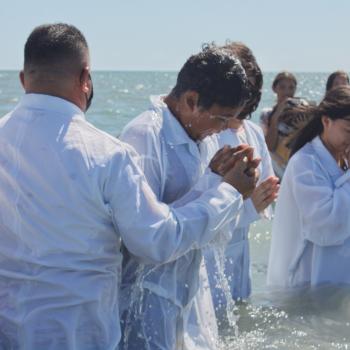Considering the title, it might seem as though you’ve fallen victim to “clickbait.” Did you just get sucked into a vacuum of nonsense? Like when you couldn’t resist finding out some juicy, never-before-revealed secret about a celebrity you claim to dislike? Don’t worry, this is nothing like that. I assure you it’s all legit, and if you value truth as I do, you’ll indeed find it disturbing. So, let’s get right into it.
We know of Lydia from the book of Acts. According to our Bibles, Lydia was a God-fearing Gentile woman, who was converted by Paul at Philippi. However, in this post, we’re going to discuss the real Lydia of Scripture, that many people are unaware of.
Breaking Down Acts 16:14
First, let’s take a look at our key passage. The following is taken from Acts 16:14:
καί τις γυνὴ ὀνόματι Λυδία
and one woman fame/name of/from Lydia
πορφυρόπωλις πόλεως Θυατείρων σεβομένη
dealer of purple of city Thyateira reverencing/fearing
τον θεον ἤκουεν
the God she was listening/obeying/paying attention
Best Translation:
“And one woman with fame of Lydia, a dealer of purple of city Thyateira, reverencing the God, she was listening.”
Clarification:
“And one, an esteemed woman from Lydia, a dealer of purple, of the city of Thyateira, who respected God, was listening.”
In case you missed it, here’s the point: There’s no one in this passage named Lydia. There’s only mention of a certain woman whom Paul and his crew encountered. The Greek noun onomati can simply mean “name,” but it can also mean “fame,” “glory,” or “reputation.” In this passage, the latter is the better translation, and in a moment, we’ll look at why.
Discovering the Real Lydia of Scripture
So, then who is the real Lydia of Scripture? The question is not who, but what? For those who don’t know, Lydia in the Bible was a place — the region or province of Lydia.
Lydia, originally named after its first king Lydus, was located in Asia Minor, also called Anatolia (Cartwright). Thyateira, a city known for its “purple selling,” was located in the northern part of Lydia (Perseus).
Ancient Lydia was a prosperous land, known for its gold and silver, and was supposedly the first, or among the first, to produce coins. Historically, Lydians were known as merchants and were also polytheists, which meant they worshiped multiple gods.
Therefore, though the Lydian woman respected the Lord, she probably worshiped and prayed to other gods, which is a big “no-no.” Nevertheless, as a result of Paul’s teachings, she repented, meaning she acknowledged the God of Abraham as the one true God and accepted his chosen king, Jesus Christ.
Several verses later, we see evidence that the real Lydia of Scripture was in fact a place, not a person. Except for maybe five or six translations, all English versions say that when Paul and Silas left prison, they went to Lydia’s house (v.40). However, the verse in Greek, generally reads as follows:
εξελθοντες δε εκ της φυλακης εισηλθον εις την λυδιαν και ιδοντες τους αδελφους παρεκαλεσαν αυτους και εξηλθον
“House” or “home” is the Greek word οἶκος. You don’t have to read Greek to see that οἶκος isn’t in this verse. As the text says, they entered εις την λυδιαν, that is, into the Lydia, or simply into Lydia. There’s no justification for adding the word “house.”
Okay. Look, I get it. Without the word “house,” it sounds like the apostles took part in some perverted sexual act with a woman named Lydia. And we can’t have that, can we? So do we just alter God’s word based on our own understanding? Absolutely not.
Unless it’s a matter of grammar, there’s never a good reason to add or take away from Scripture. It’s misleading and it pollutes the pure word of God. Instead, we should pray for understanding, asking God to guide us to the truth.
So, it’s likely that Paul and Silas stayed at Philippi for some days before they were arrested and jailed. After their release from jail, they would have left Philippi, in Macedonia, and entered the region of Lydia, to meet the woman they’d met at the river.
Being the master of her house, she’d revealed the desire to continue in Paul’s teachings (v. 14). The brethren may have traveled to Lydia for this purpose. After she and her household were baptized, she entreated the men to tarry (v. 15). So, Paul and the others accepted, exhorting the brethren there, then they left (v. 40).
Possibly, this is why they couldn’t preach in Asia before (Acts 16:4). Through this humble, reputable woman, perhaps the Lord was opening a door that not just some, but many would walk through. His timing is always on point and with a purpose.
How Is Discovering the Real Lydia of Scripture Disturbing?
So, to conclude, Scripture doesn’t indicate that “Lydia” was the personal name of the woman mentioned in Acts 16. Her name wasn’t Lydia, but she was from Lydia. In fact, according to many sources, the name Lydia used today, literally means “a woman of Lydia.”
So, what’s the big deal about this seemingly insignificant detail? I mean, who cares what her name was?
Exactly! For the most part, Nobody cares.
That’s probably why it wasn’t mentioned. Her name neither adds or subtracts anything from the passage. Paul wants us to focus on her actions, not her personal identity.
But why is this whole thing disturbing? It’s because though this is a small thing, it’s the way many divisions and false doctrines have entered the church—through relying on mistranslations of Scripture, along with our own understandings. The Father must be grieved by such things.
But, how can we address the problem? God and his word deserve to be represented correctly, so how can we do this? We do this by seeking truth—His truth.
A Call to Return to Truth
Roughly 500 years ago, when the New Testament was first translated into English, there was no internet and limited resources. What’s the reason for our ignorance today? Why do we hesitate to ask questions? Why do we condemn those who challenge traditional thinking?
Do we believe our English Bibles are divinely translated by God? They’re not. Could it be that we aren’t seeking God’s will and truth as we claim? I believe so.
Isn’t it time we stopped relying on traditions and took God’s word more seriously? Isn’t it time we began to seek his will and study Scripture more deeply?
In these last days, the Lord is turning people back to his pure, undefiled word. Are you going to be a part of what he’s doing? Or will you stand in his way?
**Unless otherwise noted, the thoughts expressed in this post are my own, and are intended to guide, not replace one’s own conviction and study of Scripture.
Bibliography
Perseus Digital Library. (n.d.). Retrieved May 2, 2023, from https://www.perseus.tufts.edu/hopper/
Cartwright, M. (2016, April 03). Lydia. World History Encyclopedia. Retrieved from https://www.worldhistory.org/lydia/
Department of Ancient Near Eastern Art. (1AD, January 1). Lydia and Phrygia: Essay: The Metropolitan Museum of Art: Heilbrunn timeline of art history. The Met’s Heilbrunn Timeline of Art History. Retrieved May 2, 2023, from https://www.metmuseum.org/toah/hd/lygo/hd_lygo.htm
Sardis. The Archaeological Exploration of Sardis. (n.d.). Retrieved May 2, 2023, from https://sardisexpedition.org/en/essays/latw-greenewalt-gods-of-lydia
Britannica, T. Editors of Encyclopaedia (2023, April 11). Lydia. Encyclopedia Britannica. https://www.britannica.com/place/Lydia-ancient-region-Anatolia


















